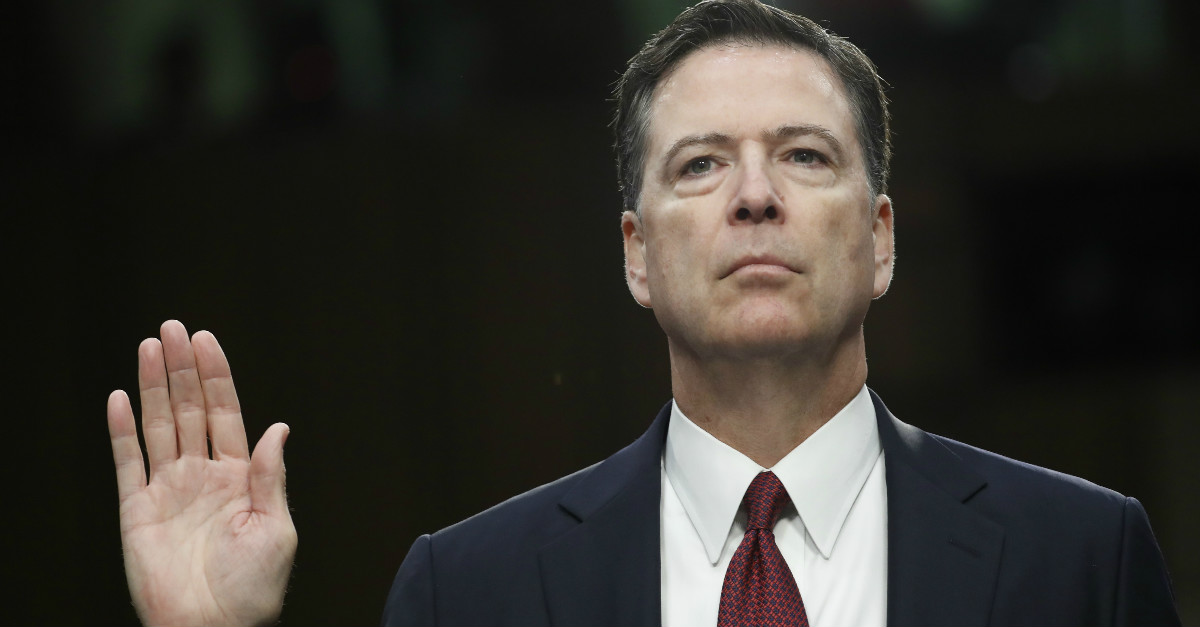A first draft of former FBI Director James Comey’s 2016 memo announcing that the FBI would bring no charges against Hillary Clinton has been made available to the public, according to The Hill.
Videos by Rare
Sen. Ron Johnson (R-WI), Chairman of the Senate Homeland Security and Governmental Affairs Committee, had staff publish the document in full on his Homeland Security and Governmental Affairs page. The document — hosted in full here — has been visibly marked up with recommended changes. According to testimony from the FBI, those changes were suggested by “subordinates” to Comey and approved by Comey before he read them aloud on national television.
One of the more contentious changes describes the handling of Clinton’s emails and the transmission of over 100 emails via an insecure private server. Comey first wrote that Clinton and her staff were “grossly negligent” in the handling of her emails; in this case, the phrase “grossly negligent” is a principle for behavior that could be subject to misdemeanor or felony mishandling of classified information charges. However, that descriptor was changed to “extremely careless,” which functions as a synonym as well as a de-escalation of the FBI’s findings.
That said, even in the original draft, it’s evident that Comey never intended to recommend charges against Hillary Clinton or her staff. In the statement, Comey indicated that charges on misdemeanor or felony mishandling of classified information involved a mix of four criteria — “clearly intentional misconduct,” “vast quantities of materials exposed” that would reasonably support the conclusion of “intentional misconduct,” “indications of disloyalty to the United States” and/or “efforts to obstruct justice.”
“We see none of that here… I am completing the investigation by expressing to Justice my view that no charges are appropriate in this case,” Comey concluded in 2016.
While Comey originally wrote “there is evidence of potential violations of the statute proscribing gross negligence in the handling of classified information and of the statute proscribing misdemeanor mishandling,” he concluded that “we are not aware of a case where anyone has been charged solely based on the ‘gross negligence’ prohibition in the statute.”
Sen. Johnson has written a letter to current FBI Director Christopher Wray inquiring about those edits — which Johnson called “significant” — and asked whether they were part of a broader campaign to protect Clinton.
Johnson says edits to the memo are more worthy of attention in light of text messages leaked by the Department of Justice last month. The texts between FBI agent Peter Strzok and his alleged mistress, lawyer Lisa Page, got Strzok fired his position on the Clinton email investigation.
The content of the messages described President Donald Trump as an “utter idiot” and “loathsome human,” among other descriptors.
“In light of the personal animus toward then-candidate Trump by senior agents leading the Clinton investigation and their apparent desire to create an ‘insurance policy’ against Mr. Trump’s election,” Johnson wrote, the edits “raise profound questions about the FBI’s role and possible interference in the 2016 presidential election.”
Johnson also addressed an edit to the memo that appears to erase any mention of cooperation with other members of the American intelligence community — a group President Donald Trump has called “political hacks” — to determine possible national security fallout from emails transmitted via Clinton’s personal email server.
While the FBI said they failed to find “direct evidence” that Hillary Clinton’s email server was successfully penetrated, they also admitted that finding such “direct evidence” would be “unlikely.” The Bureau also concluded that “hostile actors gained access to the private commercial email accounts of individuals with whom Secretary Clinton was in regular contact from her personal account.”
Comey originally wrote that it was “reasonably likely” that hostile actors accessed Clinton’s email account; that, too, was softened, replacing “reasonably likely” with “possible.”
[anvplayer video=”4078560″ station=”National Content Desk”]



